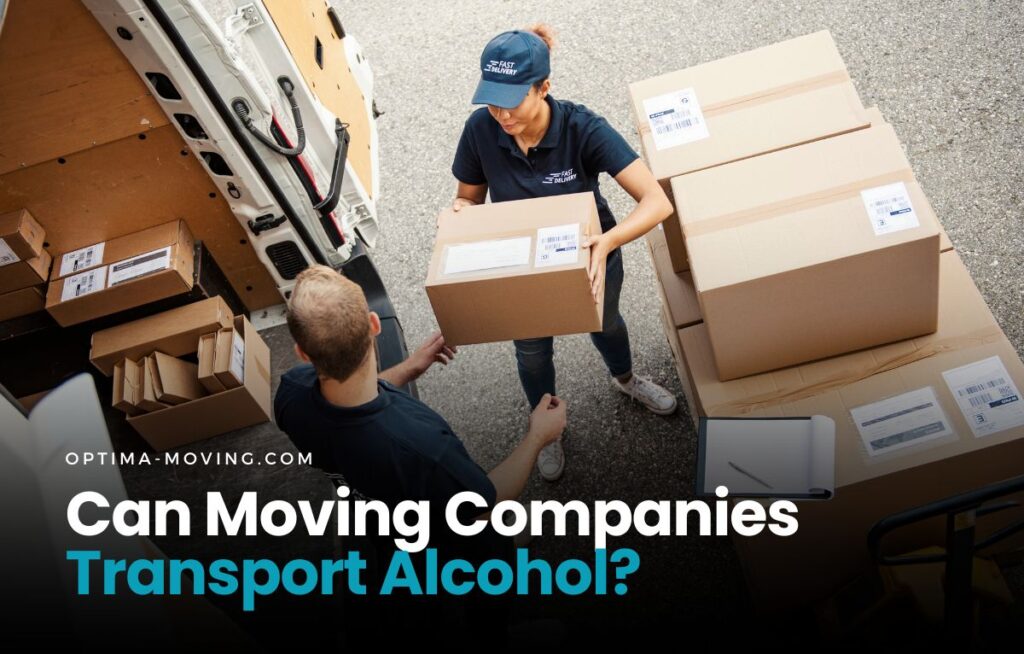On moving day, you may be packing clothing, kitchenware, and furniture without a second thought.
Then you look at your wine rack, beer collection, or a few rare bottles of whiskey and wonder: can moving companies transport alcohol for you?
It sounds simple, but the answer depends on laws, moving company rules, and how prepared you are for the process.
Alcohol is unlike most household goods—it requires careful handling, attention to temperature, and knowledge of regulations in each place you travel through.
For some, these bottles are more than beverages; they’re valuable investments, rare finds from travels, or gifts tied to personal milestones.
That makes the thought of losing them to breakage, spoilage, or confiscation even more concerning.
The good news is that with the right preparation and understanding of the rules, you can move alcohol safely and legally.
Why Alcohol is Tricky to Move
Alcohol can be one of the most sensitive and risky items to relocate. The glass bottles can break if dropped or stacked poorly, and spilled liquid can damage surrounding belongings.
Fine wine or craft beer may lose its quality if exposed to heat, cold, or frequent temperature changes.
High-value bottles are also attractive to thieves if not packed and stored securely.
Physical safety is just one concern; liquor, beer, and wine each have their own storage requirements.
Beer is more sensitive to temperature swings than spirits, and wine can develop faults if it’s exposed to prolonged heat.
Spirits may be more resilient but can still suffer flavor changes in extreme conditions. These variables make moving alcohol more complicated than packing up a box of books or kitchen utensils.
Because of these risks, moving companies must carefully consider how they handle alcohol in transit.
Many use strict packing requirements or refuse alcohol entirely to avoid potential damage claims or spoilage issues.
Understanding these challenges is the first step in deciding how to move your collection.
Laws You Need to Know
In the United States, alcohol transport is regulated by the Alcohol and Tobacco Tax and Trade Bureau (TTB) at the federal level, but each state creates its own rules for bringing alcohol across its borders.
Some states allow only a limited quantity of alcohol for personal use without a permit. Others have no restrictions at all. The variation in rules means what is fine in one state may be illegal in the next.
If you are moving internationally, the regulations become more complex. Customs offices in each country set their own import limits, require declarations, and often apply taxes or duties to alcohol brought in for personal consumption.
Failing to declare your alcohol at customs can lead to confiscation, fines, and in some cases, legal trouble.
Another important factor is local licensing laws. Some states require you to be licensed to transport large quantities, even if it’s for personal consumption.
This is especially relevant for wine collectors who may have hundreds of bottles. Before you pack a single bottle, check the regulations for your starting point, destination, and any states or countries you will travel through.
A quick call or visit to official state websites can prevent costly mistakes.
What Movers Will and Won’t Do
Even when you are allowed to transport alcohol legally, moving companies can set their own policies.
Some will accept sealed bottles if they are packed in specialized boxes, while others refuse alcohol entirely to avoid damage, theft, or spoilage issues.
Policies can also depend on the moving distance and the time of year—summer heat or freezing winter temperatures can make alcohol transport riskier.
Even for companies that accept alcohol, there may be strict conditions: bottles must be unopened, packed in manufacturer cases or specialized wine boxes, and clearly labeled as fragile.
Movers may also exclude alcohol from their insurance coverage, meaning you could be responsible for replacement costs if something happens.
Before you sign any agreement, ask the company directly: “Can moving companies transport alcohol under your policy?”
If the answer is yes, request details on packing standards, insurance coverage, and how your boxes will be handled during loading and unloading. Get their response in writing so you have clear documentation.
Options When Movers Say No
If your chosen moving company declines, there are still ways to transport your bottles safely.
Moving alcohol in your own vehicle gives you full control over handling and temperature.
This option works best for small to medium collections and allows you to inspect your bottles during travel.
Another option is to hire a specialty shipping service for wine, beer, or spirits.
These companies often use climate-controlled vehicles, track your shipment, and provide extra insurance for high-value collections.
For long-distance or international moves, this may be the safest choice.
Some people also choose to downsize their collection before moving.
Selling or gifting bottles that would be difficult to transport can reduce costs and simplify packing.
For collectors, this might be a good opportunity to refresh the selection after settling into a new home.
Step-by-Step for a Safe Move
A careful plan makes alcohol transport smoother and less stressful:
- Check legal restrictions for your route, including state or country-specific limits.
- Confirm the mover’s policy in writing or decide on a personal transport method.
- Use sturdy, divided boxes designed for wine or spirits, wrapping each bottle securely to prevent movement.
- Add extra cushioning for rare or expensive bottles and label boxes “Fragile – Glass” if your mover allows it.
- Consider climate control for sensitive items like fine wine to maintain quality during transit.
- Keep an inventory list so you can verify all bottles arrive intact.
- Unpack promptly at your destination and inspect for damage or temperature-related spoilage.
These steps protect your investment and reduce the risk of losing bottles to breakage, theft, or temperature changes.
Even a small effort in preparation can make the difference between a smooth arrival and an unfortunate loss.
Alcohol Transport Done Right
So, can moving companies transport alcohol without breaking rules or damaging your bottles? It depends on your destination’s laws, the mover’s internal policies, and how carefully you prepare your collection.
The right approach starts with research, continues with clear communication, and ends with secure packing and quick inspection at your new home.
With some planning, your favorite wine, beer, or spirits can arrive just as you remember them.
For moves in Maryland or the surrounding areas, Optima Moving can guide you through your options and help make your relocation as smooth as possible.




